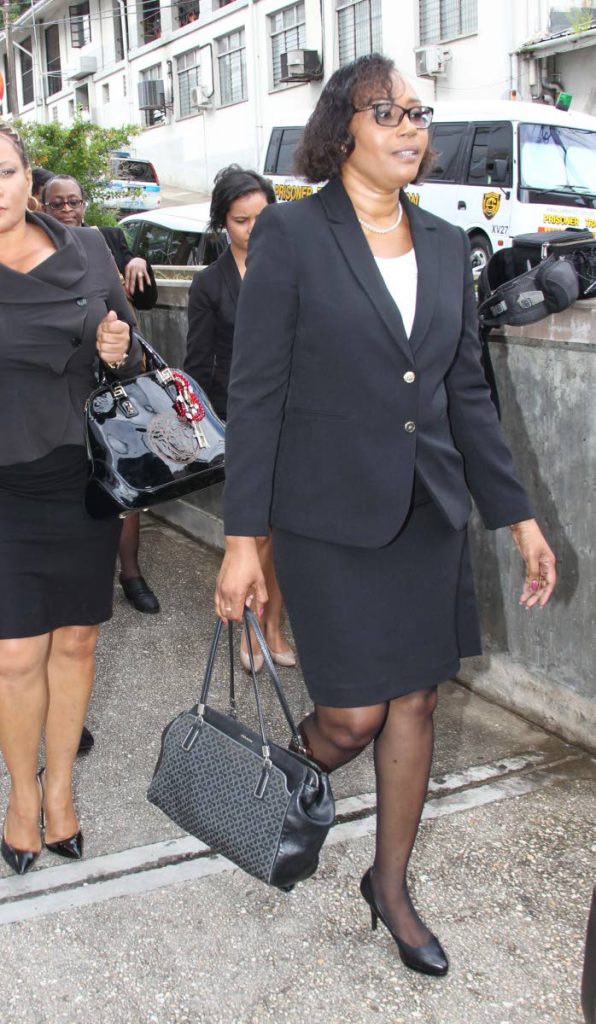President’s powers can be tested

UPDATE:
THE powers of the President can be tested in the courts.
This was the finding of two appellate court judges, who agreed that the actions of this country’s highest office-holder can be reviewed by the courts.
It was another victory for former chief magistrate Marcia Ayers-Caesar, as two appellate court judges struck down the appeal of the Attorney General challenging the permission Ayers-Caesar received to bring judicial review proceedings against former President Anthony Carmona.
Ayers-Caesar was granted leave in Septemberby Justice David Harris to have the court review decisions of the Judicial and Legal Services Commission (JLSC) and Carmona. She is claiming the JLSC acted unlawfully in seeking her resignation as a judge, that it unlawfully procured her resignation and it acted unlawfully in treating as effective her consequent purported resignation. Ayers-Caesar is also contending that the President’s continued refusal to set aside her resignation and reinstate her as a judge is unlawful.
The AG was named as representing the State in respect of the decisions of the President of which she complained. The JLSC did not appeal Harris’s ruling.
In their majority decision, acting Chief Justice Allan Mendonca and Peter Jamadar agreed the President was the correct party to Ayers-Caesar’s lawsuit. They also urged that the issues raised by her should be dealt with expeditiously and given priority, as they were of great public importance, and the longer they remain unresolved, the longer the administration of justice remained handicapped.
Justice Nolan Bereaux dissented, ruling that the President had no power to set aside a resignation or to reinstate a resignation already accepted.
Each of the three judges gave their own written ruling.
In his ruling, Mendonca said the issues raised in Ayers-Caesar’s judicial review claim were of “importance not only to the parties to these proceedings, and the office of the President, but to the general public as well.”
Jamadar said, “It is hoped that this matter will be dealt with expeditiously and given priority. A dispute such as this one, between the JLSC and Chief Justice on one hand and a judge of the Supreme Court on the other, can only serve to undermine public trust and confidence in the legitimacy and integrity of the administration of justice, if left unresolved for any length of time.
“The allegations to be investigated and reviewed therefore need to be determined as soon as possible, as the longer they remain unresolved the longer the administration of justice remains handicapped by their debatable implications. The public interest demands no less.”
Both Mendonca and Jamadar pointed out that the president appointed Ayers-Caesar. Mendonca said it was arguable that he had a power to reconsider his decision to receive her resignation and a duty to do so if he discovered he might have received a resignation that had no legal effect.
Jamadar said she was duty-bound to address him in relation to her purported resignation and its alleged unlawfulness and nullity.
They also pointed out that it has not yet been established whether her resignation was obtained by duress, unlawful pressure or any other unlawful means, as she has contended. The controversy stemmed from Ayers-Caesar’s resignation from the magistracy in April 2017, to take up an appointment as a judge. Her appointment, however, caused an uproar in the legal profession and among prisoners. because she left over 53 outstanding matters at the magistrates’ court.
Ayers-Caesar contended she did not tender her resignation of her own free will, but was forced by Chief Justice Ivor Archie, who is head of the JLSC, into signing an already-prepared document on April 27 last year and have it submitted to Carmona.
She said three weeks later, on May 19, she wrote another letter to Carmona, stating the circumstances under which the resignation was signed and submitted.
She asked him to set aside the resignation and reinstate her to the position of High Court judge.
However, Carmona failed to consider this, she claimed.
She argued that Carmona was aware of the undue pressure that was being placed on her, yet went on to accept the resignation.
The Attorney General was represented by Senior Counsel Reginald Armour and attorneys Ravi Nanga, Ravi Heffes-Doon and Zelica Haynes-Soo Hon. Representing Ayers-Caesar are Senior Counsel Ramesh Lawrence Maharaj and attorneys Ronnie Bissessar and Vijaya Maharaj.
ORIGINAL STORY:
In another victory of sorts for former chief magistrate Marcia Ayers-Caesar as two appellate court judges struck down the appeal of the Attorney General challenging the permission she received to bring judicial review proceedings against former President Anthony Carmona.
Ayers-Caesar in September was granted leave by Justice David Harris to have the court review decisions of the Judicial and Legal Services Commission (JLSC), and Carmona.
Ayers-Caesar is claiming the JLSC acted unlawfully in seeking her resignation as a judge, that it unlawfully procured her resignation and it acted unlawfully in treating as effective her consequent purported resignation. Ayers-Caesar is also contending that the President’s continued refusal to set aside her resignation and reinstate her as a judge is unlawful.
The AG was named as representing the state in respect of the decisions of the president of which she complained.
The JLSC did not appeal Harris’ ruling.
In their majority decision, acting Chief Justice Allan Mendonca and Peter Jamadar both agreed that the President was the correct party to Ayers-Caesar’s lawsuit.
Justice Nolan Bereaux dissented, ruling that the president had no power to set aside a resignation or to reinstate a resignation already accepted.
The Attorney General was represented by Senior Counsel Reginald Armour, and attorneys Ravi Nanga, Ravi Heffes-Doon and Zelica Haynes-Soo Hon. Representing Ayers-Caesar are Senior Counsel Ramesh Lawrence Maharaj and attorneys Ronnie Bissessar and Vijaya Maharaj.


Comments
"President’s powers can be tested"